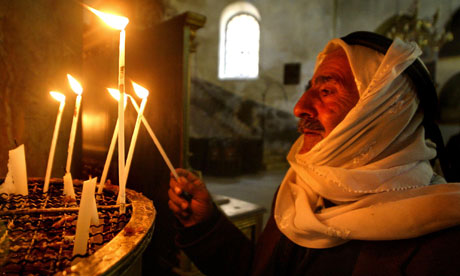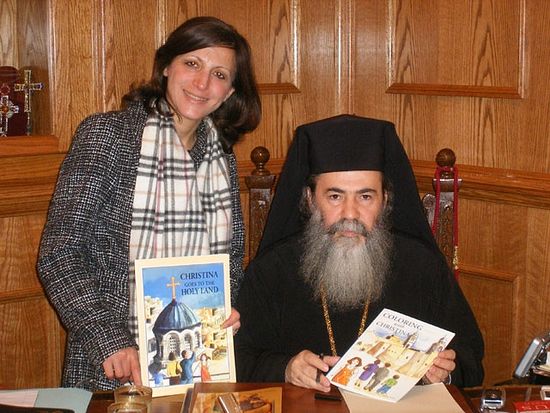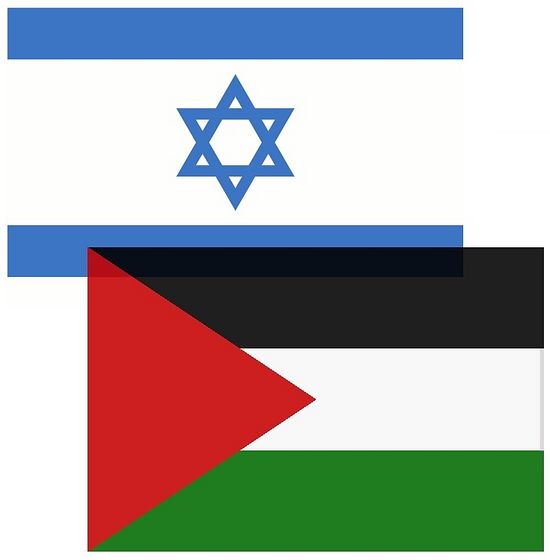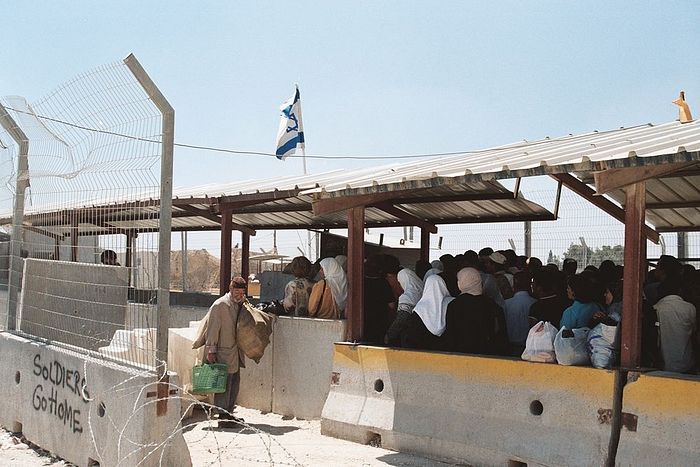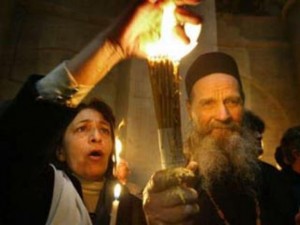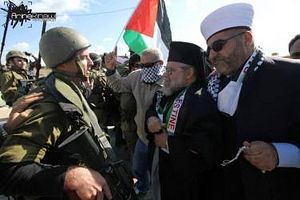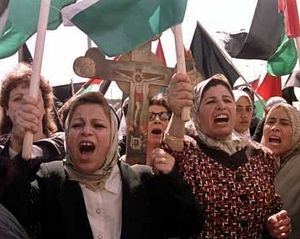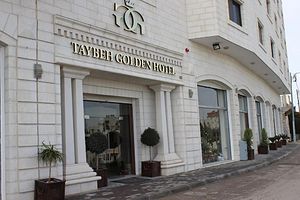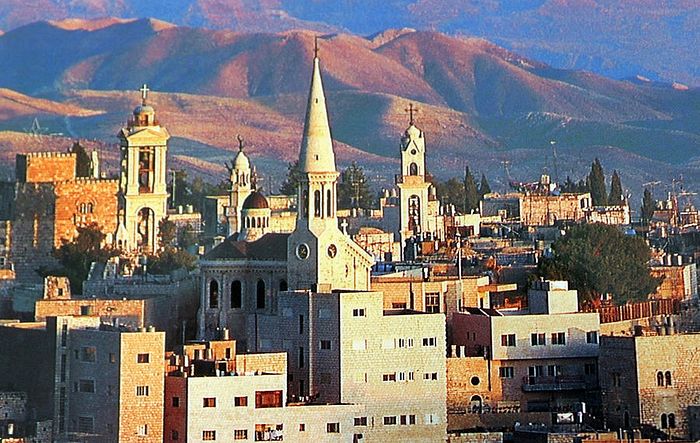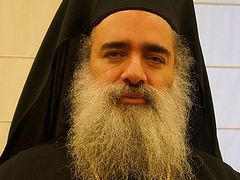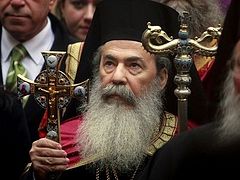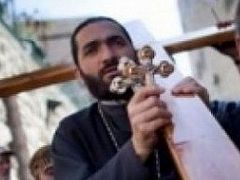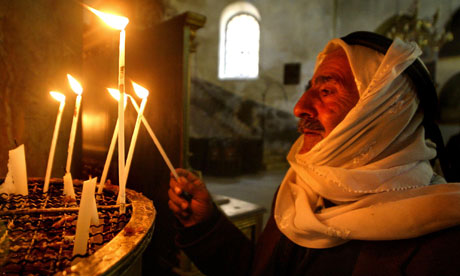
A Greek-American who has lived in Palestine since 1995, Maria C. Khoury, Ed.D., is the driving force behind charitable and municipal projects in her town, Taybeh. She is also the author of Orthodox Christian Children’s Books, including the well-known “Christina goes to the Holy Land”, in which “Christina” walks in the footsteps of Christ. After graduating from Hellenic College and then earning her doctorate in Massachusetts, Maria married a fellow Hellenic College graduate, David Khoury, and together they settled in his hometown in the West Bank, riding the wave of optimism following the Oslo Peace Accords of 1993, which seemed to promise the establishment of a Palestinian State In 22 percent of historic Palestine.
David and his brother Nadim opened the Taybeh Brewing Company (taybehbeer.com), the first microbrewery in the Middle East, in 1994 – an admirably successful enterprise that has provided a significant boost for the Palestinian economy. Maria has written not only children’s books, but also a book for adults, Witness in the Holy Land (2003), and uses the proceeds from her writings to support her ministry, especially the Taybeh Education Fund, established in 2006. Taybeh’s population of less than two thousand people is entirely Christian. The town, located 21 miles north of Jerusalem, has a history dating back to Biblical times. Now that the Khoury family has opened the new Taybeh Golden Hotel – with the Taybeh Winery next to the lobby (taybehwinery.com), and their brewery within a ve-minute walk – it is convenient for travellers to visit this ancient seat of Christianity, which once hosted Jesus Him – self, as Maria explains (below).
Carole Monica Burnett, Ph.D., conducted this interview with Maria in November 2015, partly in person and partly by email. Monica, a member of Holy Cross Orthodox Church in Linthicum, Maryland, is employed as the editor of the Fathers of the Church series, an expanding set of translated patristic texts published by the Catholic University of America Press in Washington, D.C. She also serves on the Board of Trustees of Friends of Sabeel, North America, an affiliate of Sabeel in Jerusalem; both of these Christian organizations strive to educate the public about the need to bring peace with justice to Palestine and Israel through non-violent means.
MARIA, HOW MANY CHURCHES ARE IN TAYBEH? IN PARTICULAR, TELL US ABOUT THE ORTHODOX PARISH.
Our small town has a solidly Christian identity and an abundance of churches in one of the most ancient sites in Palestine. time, raised the money for our church building from Taybeh people abroad.
ARE YOU ABLE TO GO TO JERUSALEM FOR HOLY WEEK OR TO BETHLEHEM FOR NATIVITY SERVICES? HOW THRILLING IT MUST BE TO CELEBRATE THESE MOST SACRED TIMES IN THE HOLY LAND!
Although pilgrims and tourists can travel easily between Taybeh and Jerusalem, I am sad to say that the Holy City is often inaccessible to Palestinian Christians because the Israeli authorities require a special permit, which is obtainable only through a frustrating process. I can’t discern any pattern in their decisions to grant these permits. For example, the nuns in Ramallah might get a permit to enter Jerusalem for Palm Sunday at the same time as the Taybeh nuns are refused. Why? Also, Israel typically grants 450 to 500 permits for Christians from Gaza during Pascha, but, since there are fewer than 1,500 Christians in all of Gaza, why not simply allow all of them to celebrate Our Lord’s Resurrection in Jerusalem? Some might be elderly and could not make it, but all should have the right to worship freely in a country that others refer to as “the only democracy in the Middle East.” There seems to be no logic in these decisions. The permit system is a way to humiliate and degrade people. I have enough personal permit stories to write a book.
Also, it is not easy to get to Bethlehem. Normally, the drive from Taybeh to Bethlehem would take 45 minutes, but there is a major Israeli checkpoint that clogs up the traffic because Palestinians are not allowed to go through Jerusalem, which is a faster ride to the birthplace of our Lord. Palestinians can spend hours at this checkpoint, and then sometimes be denied transit and sent back home. And, by the way, when we drive from Taybeh to Bethlehem, we are actually going from Palestine to Palestine, nowhere near any threat to “the security of Israel,” although in the mass media you always hear that the checkpoints are for “the security of Israel.” Bethlehem is closed in with a huge wall, very much a physical prison with twenty-two settlements all around the hilltops. I should mention, however, that Holy Week in Taybeh is glorious.
On Palm Sunday all the faithful with church leaders, including the altar boys and Scouts, march together through the streets, ending up at the “Al Khader,” the Byzantine church ruins of St. George, for ecumenical prayer. On Holy Saturday, members of all our churches wait at the town’s entrance to receive the Miracle of the Holy Fire from the Holy Life-Giving Tomb of Christ, the miraculous flame that travels with Scouts from the Holy Sepulchre in Jerusalem. We receive it with joy and ceremoniously carry it with the altar boys and Scouts to the altar of St. George’s Church in preparation for the midnight Holy Pascha Liturgy. My husband’s cousin Ibrahim has been helping transport the Holy Fire to Taybeh since his childhood and is now passing that sacred tradition to his son Philip! We used to receive it directly from Jerusalem. Since Israeli restrictions, such as permit requirements, have been imposed, however, the Scouts bring the flame to Ramallah as soon as it is received by the Greek Orthodox Patriarch, and all of the surrounding villages, including Taybeh, send a representative to transport it to their church.
The Miracle of the Holy Fire is the most magnificent event celebrated in the Holy Land. It is the best kept secret of the Holy Land. It is very common for Muslim leaders like the Palestinian Prime Minister and Ramallah’s female governor to march in the procession in solidarity with the Christian community. This is a reflection of the normal Christian-Muslim relations in our area, which, unfortunately, have been affected since the “war on terror.” Other examples of good relationships are Muslim people chanting the Lord’s Prayer during their special services when they read from the Koran, for example during a funeral.
WHAT ARE SOME OF THE OTHER CHALLENGES THAT THE PEOPLE OF TAYBEH ARE FACING?
Our major challenges are caused by the Israeli occupation of Palestine. One of the hardships is that there is no freedom of movement in our homeland. I mentioned earlier the difficulty of going to the holy sites to worship and pray. It is very sad to have Palestinian Christian people living ten minutes from the Holy Sepulchre, the most sacred site in Christendom, but unable to go freely to light a candle. The fact is that Israel controls all of the roads and the borders. They allow most international visitors and Israelis to move around freely, but Palestinians suffer under an apartheid system. The reason why the unemployment rate in Taybeh is 50 percent is that our people cannot get permits to work in Jerusalem as they used to do before the second uprising, which began on September 28, 2000.
Currently we seem to be experiencing another uprising because people cannot tolerate occupation any longer. We have gotten to the point of feeling, “Give me freedom or give me death.” In response, the Israeli army now has a policy of shooting to kill. Since October 1, 2015, more than 100 Palestinians have been killed and thousands injured on their way to school or work. During the War on Gaza in 2014 more than 2,000 people were killed, including 495 children. My mother-in-law’s first cousin, Jalileh, was killed in her own home by an Israeli air strike while her son, Jeries, barely survived with burns over 90 percent of his body and the loss of both legs.
In the eyes of Israel, we are all “terrorists,” young, old, female, male, Muslim, Christian. Israel is above all laws. Israel also controls our natural resources, particularly land and water. In Taybeh we have running water on only two days of every week, whereas the three Israeli settlements that surround us enjoy water seven days a week, twenty-four hours a day. Since there is a water shortage, it is normal for Palestinian villages to be last in priority to receive water. The settlements, which are illegal under international law, are growing and closing in on us, forcing us to cope with losses of both water and land.
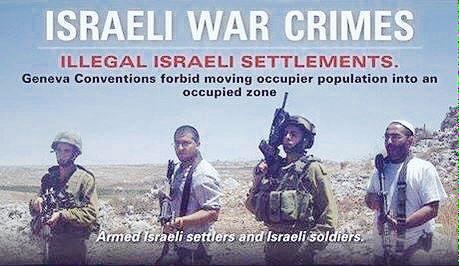
The settlement of Rimonim and the new outpost in front of my kitchen window are built on confiscated Taybeh land. This year alone, 14 dunams in Taybeh were confiscated by the Israeli government for so-called “security reasons”; ten out of these fourteen dunams belong to the Khoury family. (A dunam is approximately a quarter of an acre.) In addition, the settlers burned 20 dunams of a wheat field last June belonging to the Hanna family in a mass flare-up of hate crimes throughout the Holy Land. (That is like destroying almost five football fields of land.) What is very sad about hate crimes is that settlers are hardly ever punished. A Palestinian family near Nablus was burned to death by settlers who were never punished. Our newest saint from Palestine, St. Philoumenos, was martyred at the hands of fanatic Israeli settlers at Jacob’s Well. The current abbot, Fr. Justin, has survived over eight attacks. A major result of these challenges is that our Christian population is migrating to other countries of the world in order to find economic opportunities, freedom of movement, and a future for their children. The Christian population of the Holy Land has now dwindled to less than 1.5 percent, and Taybeh is feeling the effects of this ongoing emigration.
WHERE DO YOU FIND HOPE FOR THE FUTURE OF THE CHRISTIAN COMMUNITY?
There are three sources of hope for me: the prayers of many people, international visitors, and contributors to our Orthodox projects. When people from around the world come to visit us, they see with their own eyes the burdens under which their fellow Christians in the Holy Land are struggling, and they gain a better understanding of the situation.
Also, through their tourism they are nourishing our economy. Of course, in order to attract visitors to Taybeh, we need peace and stability – and this is something to pray for. The eighty rooms at the Taybeh Golden Hotel can be filled if church groups across America will consider pilgrimages for solidarity and include Taybeh on their list of noteworthy places to visit (taybehgoldenhotel.com).
There are also generous donors who have contributed to our housing project since 2000 and our education fund since 2006. We have been able to provide affordable homes for 24 families, and we are hoping to build the last duplex home with the latest funds sent to the Greek Orthodox Metropolis of Boston, who have helped us maintain an American address and collection point all these years. Since each new home is actually the shell of a house, the families install their own flooring and interior walls. These are duplex homes, side by side, and they are constructed in such a way that the families can build a second floor to house their grown children. This option allows the Taybeh Orthodox Housing Project to have long-term sustainability.
I am extremely grateful to people who support our Christian witness in the Holy Land. The Taybeh Education Fund, set up as an endowment, helps pay the registration fees for 15 students at the Greek Orthodox School in Taybeh. Another major component of the Education Fund is the assistance provided for college education with an annual $1,000 scholarship to study locally. Palestinians are keenly aware that education is a necessity for a better future, and we are hoping to increase the funds available to help, especially our college students.
The situation is challenging at the moment, though, because the interest rates have sunk so low, forcing us to dig into our principal. I have given presentations at more than 140 churches with my “Christina” books, which have led to establishing a relationship with our sister church, St. George Greek Orthodox Church in Bethesda, Maryland. It is a great comfort not to be “the forgotten faithful” because our sister church expresses love for the global neighbour. We have also been blessed with six annual donors who each sponsor a child, thus helping us maintain the endowment fund. This leads me to the primary source of hope: prayer. Miracles can happen if we pray, and there can be no doubt that God is listening. I truly believe that the only way to have a free Palestine is by a miracle. Please put us on your prayer list. I personally pray for an end to the bloodshed and hostility, for healing and reconciliation, and for a peace with justice. I continue to hope that my classmates who are bishops will pray for the Holy Land and become a loud voice to end the occupation.
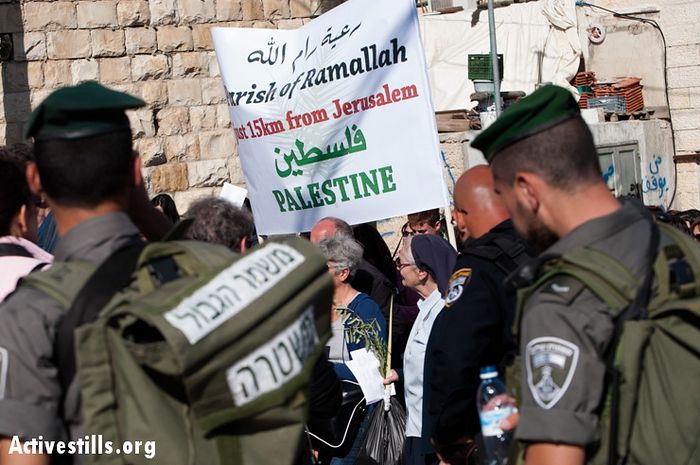 Israeli soldiers watch as Palestinian Christians in the annual Palm Sunday procession carry signs naming their West Bank communities, all of which are cut off from Jerusalem by the Israeli separation barrier, requiring their residents to obtain special permits to enter, March 24, 2013. Such restrictions have dramatically reduced the number of Palestinians able to participate in religious traditions of any faith in Jerusalem. Palm Sunday is the Christian celebration of Jesus’ triumphal entry into Jerusalem as the “Prince of Peace” the week before his crucifixion.
Israeli soldiers watch as Palestinian Christians in the annual Palm Sunday procession carry signs naming their West Bank communities, all of which are cut off from Jerusalem by the Israeli separation barrier, requiring their residents to obtain special permits to enter, March 24, 2013. Such restrictions have dramatically reduced the number of Palestinians able to participate in religious traditions of any faith in Jerusalem. Palm Sunday is the Christian celebration of Jesus’ triumphal entry into Jerusalem as the “Prince of Peace” the week before his crucifixion. WHAT CAN ORTHODOX CHRISTIANS IN THE U.S. DO TO HELP YOU?
In addition to the three primary things that I have just discussed – praying, visiting, and supporting Orthodox projects – Americans can read their newspapers and listen to newscasts critically, questioning what they see and hear. The mainstream media in the U.S. communicate hardly any information at all about Palestinian deaths at the hands of the army, home demolitions, land confiscation, or settler attacks. So it is important to look at alternative news sources like Al Jazeera and Washington Report on Middle East Affairs. Also, please speak out against the occupation of Palestine, especially in regard to the amount of taxpayer funds that are subsidizing it. The organization called “If Americans Knew” reports over 10 million dollars per day taken from hard-earned American taxpayers’ money and given to Israel. The Christians of Palestine need Americans to stand up for them. They specifically asked for a loud voice from churches around the world in the Kairos Palestine document, signed by all the heads of churches six years ago in Bethlehem, stating that occupation is a sin.
MARIA, I VISITED TAYBEH IN 2009 AND 2014 AND WILL NEVER FORGET THOSE UPLIFTING EXPERIENCES. MY PERSONAL HIGHLIGHTS WERE THE FOURTH-CENTURY CHURCH RUINS WITH ITS MOSAICS (WHERE I PRAYED THE TRISAGION PRAYER IN UNITY WITH ALL ORTHODOX CHRISTIANS THROUGHOUT THE CENTURIES) AND THE ANCIENT PALESTINIAN HOME THAT HAS BEEN PRESERVED AND IS OPEN TO VISITORS, AS WELL AS THE MORE LIGHT-HEARTED SITES SUCH AS THE KHOURY FAMILY BREWERY AND THE LITTLE CRAFT FACTORY WHERE “PEACE LAMPS” ARE MADE. I AM EAGER TO RETURN TO TAYBEH SO THAT I CAN SEE THE NEW WINERY AND HOTEL AND MEET MORE PEOPLE!
Yes, it is so important for people to know that, in spite of the challenges that Palestinians have to struggle with, a visit to Palestine, especially a visit to Taybeh, is certainly not a grim experience. Quite the opposite! Many visitors have experienced a beautiful, inspiring pilgrimage or a fascinating tourist exploration, or both. People have actually come to Taybeh just for a beer tour and discovered we are the only Christian village left, the last Christian stronghold in Palestine. I think that shows that God has humour! Some people have experienced Taybeh as the highlight of Palestine! (saintgeorgetaybeh.org)
I want to personally encourage students to join the Real Break OCF Jerusalem trip, March 4–12, 2016. It was the greatest blessing that they were the very first group to stay at the Taybeh Golden Hotel this last March. My daughter Elena, also a Hellenic College graduate and a lawyer by profession, is overseeing the hotel and served as a tour guide when Fr. Nick Jonas from Chicago led the small group. Find out about the Orthodox Campus Fellowship (OCF) trip to Taybeh: http://www.ocf.net/jerusalem/.
We are always delighted to receive guests and eager to extend our warm “Taybeh” hospitality. Please come to see and pray in our ancient churches, to taste our food, and to encounter kindred spirits among us. Our witness for Christ is a light shining in the heart of Palestine.
